
Studi e Saggi Linguistici
Scope & Guideline
Advancing the Frontiers of Linguistic Research
Introduction
Aims and Scopes
- Historical Linguistics and Language Change:
The journal frequently publishes studies examining the evolution of languages, focusing on morphological, phonological, and syntactic changes over time, particularly in Indo-European and Romance languages. - Morphosyntactic Analysis:
A core area of research involves detailed analyses of morphosyntactic structures, including the study of grammatical categories, syntactic constructions, and their semantic implications across different languages. - Phonology and Phonetics:
Research on phonological systems, sound changes, and the phonetic realization of linguistic elements is prominent, with studies often exploring the phonetic and phonological characteristics of various languages. - Language Typology and Description:
The journal emphasizes linguistic typology, offering comparative studies that classify languages based on structural features and describing lesser-studied languages and dialects. - Sociolinguistic Perspectives:
There is a growing interest in the sociolinguistic aspects of language, including language variation, contact, and the social implications of linguistic phenomena. - Interdisciplinary Approaches:
The journal encourages interdisciplinary research, integrating perspectives from fields such as cognitive science, anthropology, and pathology to enrich linguistic studies.
Trending and Emerging
- Indefinite Quantifiers and Numerals:
Recent studies have increasingly focused on the interaction between indefinite quantifiers and numerals in various languages, exploring their syntactic and semantic properties, which indicates a growing interest in quantification in linguistics. - Explorations of Language Variation:
There is a noticeable trend towards investigating regional varieties and dialects, particularly within Romance languages, highlighting the journal's commitment to documenting and analyzing linguistic diversity. - Morphological Studies of Slang and Informal Language:
Research on the morphosyntactic features of slang and informal registers has surged, reflecting a broader interest in the dynamics of language use in contemporary settings. - Cross-Linguistic Comparisons:
An increase in studies comparing linguistic features across different languages signals a trend towards a more global perspective in linguistic research, emphasizing typological and comparative analyses. - Phonetic Reduction and Speech Patterns:
Emerging studies on phonetic reduction strategies in spoken language suggest a growing interest in the relationship between phonetics and everyday language use, particularly in informal contexts.
Declining or Waning
- Language and Pathology:
Research connecting linguistic structures with developmental language disorders and other pathologies appears to be less frequently addressed in recent issues, possibly indicating a shift towards more traditional linguistic studies. - Translation Studies:
While translation strategies were once a more prominent theme, recent publications suggest a decline in this area, with fewer studies exploring the intricacies of translation in historical texts. - Narrative and Discourse Analysis:
The focus on narrative abilities and discourse analysis has diminished, suggesting a potential waning interest in these topics within the journal's scope. - Linguistic Criticism and Historical Texts:
Although still present, the frequency of papers critically analyzing historical linguistic texts has decreased, indicating a possible shift towards more empirical and data-driven linguistic research. - Philosophical Linguistics:
Discussions surrounding the philosophy of language, including the conceptual foundations of linguistic theories, seem to be less prevalent, reflecting a possible trend toward more empirical methodologies.
Similar Journals
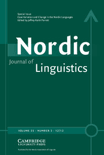
Nordic Journal of Linguistics
Elevating academic standards in language research.Nordic Journal of Linguistics, published by Cambridge University Press, serves as a prominent platform for the dissemination of cutting-edge research in the field of linguistics. Established in 1978 and spanning over four decades, the journal has curated a rich repository of scholarly work that reflects the dynamic and evolving nature of language studies. With an impressive Q2 ranking in both the Linguistics and Language category and a commendable performance in Scopus rankings, placing it at the 74th percentile among Arts and Humanities, the journal is recognized for its high academic standards and impact on contemporary linguistic research. Scholars and practitioners can access a variety of studies that delve into different languages, linguistic theories, and methodologies, fostering broader understanding and dialogue within the linguistic community. Although the journal does not currently offer open-access options, it remains an invaluable resource for researchers, professionals, and students keen on advancing their knowledge of language and linguistics.

Annual Review of Linguistics
Navigating the Evolving Landscape of Language StudiesAnnual Review of Linguistics is a premier scholarly journal dedicated to advancing the field of linguistics through comprehensive and insightful reviews of current research and emerging trends. Published by ANNUAL REVIEWS, this journal is recognized for its high impact, evidenced by its Q1 ranking in the Linguistics and Language category and exceptional placements in the Scopus Ranks, positioning it in the top 2% of its field. Since its inception in 2015, the journal has served as a vital resource for researchers, professionals, and students seeking to deepen their understanding of language theories, acquisition, processing, and sociolinguistics. With no Open Access currently available, the Annual Review of Linguistics is esteemed for its rigorous peer-reviewed articles that synthesize a wealth of knowledge, making it an indispensable tool for advancing research and dialogue within the linguistic community.
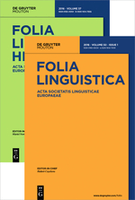
FOLIA LINGUISTICA
Exploring the Depths of Language and ThoughtFOLIA LINGUISTICA, published by WALTER DE GRUYTER GMBH, is a premier scholarly journal dedicated to the field of linguistics. Established in 1967, the journal has consistently provided a platform for innovative research and scholarly discourse in language and linguistics, contributing significantly to the academic community's understanding of language structures, usage, and cognitive processes. With its classification in the top quartile (Q1) of linguistics and language in 2023, FOLIA LINGUISTICA holds a respectable rank (#282/1088) within the Arts and Humanities category and an admirable percentile rank of 74th, ensuring its position at the forefront of linguistic scholarship. Researchers and academics from around the globe can access a wealth of knowledge and cutting-edge research findings through this esteemed publication, which is vital for anyone looking to engage with the latest advancements in linguistics. Located in Berlin, Germany, FOLIA LINGUISTICA encompasses all aspects of language research, making it an indispensable resource for researchers, professionals, and students alike seeking to deepen their understanding of language and its complexities.

Brills Annual of Afroasiatic Languages and Linguistics
Exploring the Depths of Afroasiatic LinguisticsBrill's Annual of Afroasiatic Languages and Linguistics stands as a vital publication in the field of linguistics, specifically focusing on the rich and diverse Afroasiatic language family. Published by the esteemed BRILL, this journal has garnered a reputation for rigorous scholarship since its inception in 2009, converging into its current publication cycle through to 2024. With an ISSN of 1876-6633 and an E-ISSN of 1877-6930, it enjoys a commendable Category Quartile ranking of Q2 in Linguistics and Language for 2023 and respectable Scopus rankings in both Arts and Humanities and Social Sciences. This journal aims to provide a platform for researchers, educators, and students alike, facilitating the dissemination of innovative research, critical analyses, and theoretical advancements within the Afroasiatic linguistic domain. Given its substantial engagement with contemporary linguistics, this annual publication is invaluable for those aiming to deepen their understanding of languages and dialects across the Afroasiatic spectrum.
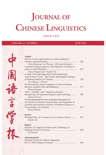
JOURNAL OF CHINESE LINGUISTICS
Illuminating the Structures and Contexts of the Chinese LanguageJOURNAL OF CHINESE LINGUISTICS, published by the JOURNAL CHINESE LINGUISTICS, is a prominent periodical that serves as a vital resource for researchers and scholars in the fields of linguistics and Chinese studies. With its ISSN 0091-3723, this journal has been contributing to the academic community since 1996 and continues to publish innovative research until 2024. Although it is classified in the third quartile (Q3) for both Arts and Humanities and Linguistics categories, its focus on Chinese linguistics positions it uniquely within this specialized domain. The journal is committed to advancing the understanding of Chinese language structures, usage, and context, encouraging interdisciplinary dialogue among linguists and language researchers. While currently not labeled as open access, the journal remains accessible to institutions and scholars worldwide, creating an invaluable platform for disseminating knowledge. As such, it plays a critical role in promoting linguistic diversity and cultural awareness within the academic landscape.

Mandenkan-Bulletin Semestriel d Etudes Linguistiques Mande
Fostering Knowledge in Mande Linguistic ResearchMandenkan-Bulletin Semestriel d'Etudes Linguistiques Mande is an esteemed academic journal dedicated to the exploration of Mande languages and linguistics, published by the Centre National de Recherche Scientifique in France. With its ISSN 0752-5443, this journal has established itself within the linguistic community, holding a notable Q3 ranking in both the Linguistics and Language category as well as respectable standings in Scopus ranks, placing it in the 55th percentile for language and linguistics. Since its inception in 2018, it has been pivotal in publishing groundbreaking research that advances our understanding of the Mande language family and its cultural implications. Although currently not open access, the journal offers a wealth of knowledge fostered through rigorous peer-reviewed articles aimed at linguists, researchers, and students alike, making significant contributions to the fields of linguistics and African studies.

Voprosy Yazykoznaniya
Innovating Perspectives in Language and SocietyVoprosy Yazykoznaniya, published by the esteemed Russian Academy of Sciences and the State Academy of Humanities (GAUGN), stands as a leading journal in the field of linguistics and language studies. With an impressive Q2 rank in Linguistics and Language for 2023 and a strong position within Scopus rankings, this journal fosters scholarly dialogue and pushes the boundaries of linguistic research by providing a platform for innovative studies, reviews, and analyses. Although not open access, its publication ensures high academic standards and visibility within the global academic community. Researchers, professionals, and students alike can benefit from the rich insights and diverse perspectives presented in this journal, serving as a vital resource for anyone interested in the intricacies of language and its role in society. Operating since 2009 and continuing to 2024, Voprosy Yazykoznaniya is an essential reference point for contemporary linguistic scholarship in the Russian Federation and beyond.
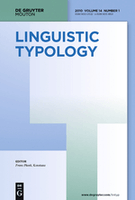
Linguistic Typology
Connecting Cultures Through Linguistic PatternsLinguistic Typology is a premier journal focused on the comparative study of language structures and the classification of languages, published by Walter de Gruyter GmbH in Germany. Since its inception in 1997, the journal has established itself as a leading platform in the field of linguistics, achieving a remarkable Q1 category ranking in both Linguistics and Language for 2023, reflecting its impact and relevance among scholars. With a notable position in the academic community, evidenced by its 91st percentile rank in Arts and Humanities and 90th percentile in Social Sciences according to Scopus, Linguistic Typology invites contributions that explore the rich diversity of language structures, promoting a deeper understanding of linguistic phenomena across various cultures. While currently not offering open access, the journal remains a pivotal resource for researchers, professionals, and students aiming to advance their knowledge in the dynamic field of linguistics. For more information, deliverables, and submission guidelines, please visit the journal's official page.
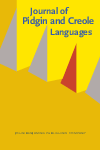
JOURNAL OF PIDGIN AND CREOLE LANGUAGES
Illuminating the Intersection of Language and SocietyJOURNAL OF PIDGIN AND CREOLE LANGUAGES, published by John Benjamins Publishing Co, is a leading international journal dedicated to the study of pidgin and creole languages, offering a unique platform for interdisciplinary research within the fields of linguistics and language studies. With an impressive impact factor reflected in its 2023 Scopus rankings—placing it in the Q2 category for both Linguistics and Language—this journal has established itself as an essential resource for academics and practitioners alike. Covering a broad temporal scope from 1986 to 2024, it promotes innovative research that advances the understanding of language evolution, socio-linguistics, and cultural dynamics. The journal’s focus on both theoretical and practical perspectives makes it particularly valuable for researchers, professionals, and students interested in the complexities of language and identity. Although it does not currently offer Open Access, its commitment to quality scholarship ensures that each issue presents cutting-edge research and critical insights into the world of pidgins and creoles.
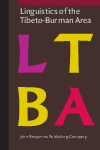
Linguistics of the Tibeto-Burman Area
Illuminating Language Structures of the Tibeto-Burman RegionLinguistics of the Tibeto-Burman Area is a premier journal dedicated to the study and exploration of the Tibeto-Burman languages, offering a significant platform for researchers, scholars, and practitioners in the field of linguistics. Published by John Benjamins Publishing Co, this journal not only maintains rigorous scholarly standards but also aims to contribute to the understanding of language diversity and evolution within the Tibeto-Burman region. With an impressive Q2 ranking in linguistics and language, it ranks in the 49th percentile within Arts and Humanities and the 45th percentile in Social Sciences, highlighting its relevance and quality in the academic community. Since its inception in 2011, the journal has been at the forefront of disseminating research that encourages interdisciplinary dialogue and fosters insights into language structure, use, and cultural implications. Though not an open access publication, it remains accessible to institutions and individuals alike, ensuring that vital academic discussions continue. The ISSN for print is 0731-3500 and for the electronic version, 2214-5907, facilitating the work of the growing scholarly community engaged in Tibeto-Burman linguistics.